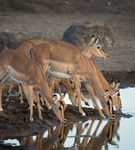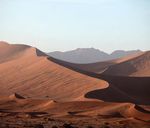FLYING SAFARI - African Wildlife Foundation
←
→
Page content transcription
If your browser does not render page correctly, please read the page content below
NAMIBIA
FLYING SAFARI
M AY 2 1 - 3 1 , 2 0 2 2
Embark on a journey to one of Africa’s most
unique destinations. Namibia is a land of stunning
landscapes, endless skies, barren deserts, rugged
mountains, and spectacular wildlife. This Namibia
safari explores some of the most remote areas of this
fascinating land —areas rarely explored by others,
making this a true journey of discovery. From the
dunes of Sossusvlei to the dramatic coastline of
the Skeleton Coast, littered with historic remnants
of shipwrecks, and remote Etosha National Park,
home to white and black rhinos and more than 340
species of birds, this Namibia safari offers a range of
experiences. This safari is ideal for the experienced
safari-goer, though it is open to any and all who have
adventure at heart.
© Martin Harvey (top), © Alison Langevad (bottom)
AWF.ORG/SAFARIS 1© Billy Dodson (top left and right, center left), © Craig R. Sholley
(center right), © AWF (bottom right), © Billy Dodson (bottom right)
AWF SAFARIS | FLYING SAFARI 2Etosha National Park
DAYS
8-10
DAYS
ONGAVA GAME RESERVE
4-5
NAMIBIA PALMWAG
FLYING SAFARI DAMARALAND CAMP
DATES GROUP SIZE DAYS
6-7
NAMIBIA
May 21 - 31, 2022 Between 6 and 10
PRICE
AWF exclusive price:
$11,889/ £8,560 per person sharing DAY
11
Dorob
Kilamanjaro
Namibia is a land of stunning landscapes, endless skies, barren
WINDHOEK
deserts, rugged mountains, and spectacular wildlife. This Namibia
Namib-Naukluft
safari explores some of the remotest areas of this fascinating land National Park DAY
1
— areas rarely explored by others, making this a true journey of
discovery. From the dunes of Sossusvlei to the dramatic coastline of
the Skeleton Coast, littered with historic remnants of shipwrecks, to
the remote Etosha National Park, home to white and black rhinos
and more than 340 species of birds, our Namibia safari offers a DAYS
2-3
range of experiences. You’ll also have the chance to learn about
AWF’s important conservation work throughout Africa. Enjoy the
SOSSUSVLEI
luxury of private reserves and wildlife viewing without the crowds.
DAY
1 WINDHOEK, NAMIBIA
Arrive in Windhoek, the capital of Namibia, and transfer
to the Am Weinberg Boutique Hotel. Meet your safari DAYS
6-7 DAMARALAND
leader and fellow travelers for a briefing on your journey
Take a short flight to Damaraland Camp. Each adobe
ahead. Meals included: dinner
and canvas thatched tent is en suite and built on a raised
deck, with valley-facing views offering endless vistas
highlighted by an ochre-purple mountain backdrop.
DAYS Near a World Heritage Site, view fascinating petroglyphs
2-3 SOSSUSVLEI / KULALA WILDERNESS RESERVE
— prehistoric rock engravings — and San rock art.
After breakfast, depart on a scenic flight to the private
Drives in search of desert-adapted wildlife and into local
Kulala Wilderness Reserve, nestled in the heart of
communities complete your exploration of this area.
Sossusvlei. Situated in the Namib Desert, this landscape
Meals included: breakfast, lunch, dinner
is famous for its huge, orange dunes, which you’ll explore
and photograph during your stay. Enjoy game drives and
walking safaris with the option to go hot-air ballooning.
Desert-adapted wildlife like the ostrich, springbok, oryx, DAYS
spotted and brown hyena, Bat-eared fox, and the dune 8-10 ETOSHA NATIONAL PARK/ONGAVA GAME RESERVE
lark abound in this area. Your thatched canvas “kulala” End your safari with three days in the wilderness haven
directly overlooks the majestic red dunes. Each room has of Etosha. You can expect unrivaled game-viewing
a rooftop “skybed” for stargazing. afforded by the tranquility of the private Ongava Game
Meals included: breakfast, lunch, dinner Reserve along the southern boundary of Etosha National
Park. The national park and the neighboring game
reserve are full of wildlife, including Black-faced impalas,
large populations of lions, white and black rhinos, and
DAYS
PALMWAG/DAMARALAND more than 340 species of birds.
4-5
Embark on another scenic flight as you head north Meals included: breakfast, lunch, dinner
over Damaraland. Your classic Meru tent at Desert
Rhino Camp is set in a remote valley of the Palmwag
Concession, a conservation partnership between our DAY
local partner, Save the Rhino Trust, and the Namibian 11 WINDHOEK/DEPART
government. The red-rock-strewn valleys, interspersed On your final day, fly back to Windhoek and connect
with tiny springs, are home to numbers of Hartmann’s to your independent homeward flight or independent
Mountain zebra, giraffe, oryx, springbok, and Spotted overnight. Meals included: breakfast
hyena. The real highlight of your time here will be
tracking the local population of endangered black
rhinos! Meals included: breakfast, lunch, dinner
AWF.ORG/SAFARIS 3Rare Desert Elephants Survive
Namibia’s Harshest Drylands
BY CARTER SMITH, AWF SAFARI PROGRAM MANAGER
T
he world’s largest terrestrial adapted elephants also appear to of the scarce resources. They will forage
mammal is also famed for have bigger feet than those in more continuously for a few days before
being notoriously water- temperate landscapes because of their resuming the trek across the rugged
dependent. African savannah elephants extended footpads. Kunene region totaling over 115,000
in temperate rangelands drink water sq. kilometers. Although elephant
almost daily and love a mudbath to stay The greater surface area stops the families are typically led by a matriarch
cool. Yet, in northern Mali’s Gourma elephant from sinking into the and other female elephants, those
region and the vast Namib Desert, this landscape’s iconic burnt orange sandy dwelling in the harsh northwest exhibit
fascinating pachyderm survives despite plains, crossing over dunes in search of a looser social structure. While scientists
the low rainfall and intense heat. food and water. Like their black rhino continue to investigate why, they have
counterparts also found in the Kunene noted that desert elephant family
These herds, aptly named desert region, desert elephants walk for units are generally smaller than other
elephants, traverse long distances in hundreds of kilometers at a time. continental populations. With fewer
brutal arid environments with only elephants per family, the herd is easier
seasonal rivers and scant vegetation Adapting to water scarcity to feed — a much-needed survival tactic
for sustenance. For years, ecologists Studies have shown that Namibia’s when food and water are days away in
thought desert-dwelling elephants desert elephants have a remarkably the harsh Namib Desert.
were a separate species of Loxodonta straitened water intake. Female adult
africana, like the forest elephant elephants and infants need water every
found in the Congo River Basin’s dense three days; males can go up to five days
tropical rainforests. But the distinctive without water. Researchers describe
characteristics and unique social desert elephants as opportunistic
structure of desert-dwelling elephants drinkers and have also observed that
are simply adaptations to the extreme they use their trunks and legs to dig
temperatures and the rocky plains of wells in dry riverbeds — even when they
northwest Namibia’s Kunene region. have access to surface water or man-
made drinking pools. Signaling their
Desert elephants have big feet ancient memory of water sources, even
There are no genetic or physiological if they are below the ground, this unique
differences between elephants found habit also tells of their need to purify
across Namibia’s wilderness — or the water before they can drink.
African savanna elephant’s continental
rangeland — but the desert variety Smaller elephant herds travel further
seems to look taller. Scientists attribute Preferring to make their arduous
this long-legged illusion to its smaller journeys for food and water at night,
body mass, the result of a lean diet of desert elephants have also adjusted © Billy Dodson (top), © Theo Allofs (bottom)
scattered grasses and shrubs. Desert- their feeding habits to make the most
AWF SAFARIS | FLYING SAFARI 4Meet Your Guides
Craig Sholley Carter Smith
AWF’s Senior Vice-President Craig R. Sholley’s AWF’s Safari Program Manager, Carter Smith, moved to
experience with wildlife and conservation began Kenya in 1994 to pursue her dream of a life of wildlife
in 1973 as a Peace Corps volunteer in Zaire. As an conservation in Africa, and she never looked back. She
L.S.B. Leakey grant researcher in the late 1970s, Craig spent her early years in the bush rehabilitating birds of
studied mountain gorillas with Dian Fossey and, in prey while completing her graduate degree in Ecology
1987, became director of Rwanda’s Mountain Gorilla on the Martial Eagle. She later joined Sir Iain Douglas-
Project, of which African Wildlife Foundation was Hamilton at Save the Elephants, while also becoming
a sponsor. Craig has acted as Scientific Advisor for one of the first female licensed safari guides with the
the award-winning IMAX film, Mountain Gorilla, with Kenya Safari Guide Association. In 2005, she founded
National Geographic. He surveyed the conservation her own safari venture and spent the next 15 years
status of mountain gorillas in the aftermath of leading private safaris in East Africa. Carter joined
Rwanda’s civil war. Craig’s direct involvement with AWF in 2019 to lead the Safari Program and looks
AWF began as a Senior Associate and member of forward to every trip when she can take guests on the
AWF’s Board of Trustees. He became a full-time adventure of a lifetime. Carter is also the author of the
employee of AWF in 2001. children’s book African Tea.
*Note: While Craig and Carter are scheduled to lead this trip, AWF is equipped with a range
of highly dedicated staff members that may lead your trip. A second leader will accompany
Craig and Carter if trip attendance permits.
To learn more or to reserve your spot, contact:
CARTER SMITH
csmith@awf.org | +1 202 939 3333 | @CarterSafari
AWF.ORG/SAFARIS 5You can also read



























































